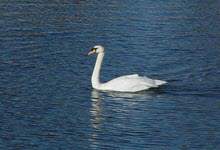Fast Facts on Swans

The Mute Swan is an introduced and invasive species in Canada, protected under the federal Migratory Birds Convention Act.
In order to have swans, municipalities have to apply for a permit from the Federal Government; our City currently has a permit for 6 Mute Swans.
The City of St. John’s currently has two nesting pairs of Mute Swans – one pair at the Bowring Park Duck Pond and one pair at Mundy Pond. Swans have been in residence at Bowring Park for many years, but our current population were purchased by the Bowring Park Foundation in 2003 from Stratford, Ontario.
Breeding
Breeding swans is regulated by the Canadian Wildlife Service.
To limit population growth, the City uses the approved and recommended practice of addling, or oiling eggs. The practice involves allowing the swan to lay all the eggs and then coating them with a non-toxic vegetable oil. This seals the pores and prevents the embryo from developing.
Is it Cruel to Addle Swan Eggs?
While it may seem to be cruel to prevent an animal from hatch an egg, it is important to remember that swans are not domesticated animals. They are wildlife and need to be treated as such.
Addling is not stressful to a swan. In fact, the practice is far less stressful than other approved methods to control the population.
After oiling, the female swan will stay on the nest for the normal gestation period, usually about a month. Since no eggs hatch, the pen will vacate the nest and go about her normal life. Removing the eggs, on the other hand, would cause stress to the female who would likely breed and lay again. Destroying the nest has the same effect, as the swans will simply rebuild their nest and start the process over again and again.
We could also euthanize the cygnets, or allow natural predators to prey on the cygnets, but this is not a practice we want to introduce to our parks.
Why not Pass on the Swans to Other Municipalities?
Allowing the eggs to hatch is not a responsible practice. It would quickly lead to more swans than our permit of six allows. Allowing cygnets to develop and then passing them off to other municipalities is not an appropriate method of population management. Should other municipalities wish to acquire a swan population, it would be their responsibility to work through the permitting and acquisition process with the Federal Government.
Why Not Neuter the Swans?
Neutering the swans is an option but not one we feel is necessary. If any of our swan population dies or we decide to introduce more swans to the population, neutering removes options to allow breeding in the future.
Why Not Request an Increase in Our Swan Population?
The City has previously attempted to introduce swans to other ponds but these attempts have been unsuccessful.
It is important to remember that swans are a non-native species with federal controls in place for a reason. We do not feel it is prudent to increase our swan population.
Why Keep Swans If We Need to Control the Population?
The City of St. John’s and all municipalities in Canada are required to use proactive, humane measures to control our swan population.
The swans in Bowring Park and Mundy Pond are a beautiful addition to these areas, but it is important to remember that they are wild creatures and need to be treated as such. Like all wildlife, they need to be treated with respect and a measure of caution. Limit your interactions with our swans to ensure they do not become aggressive around people, and that they can continue to live peacefully in our city.
